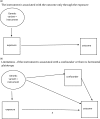Do natural experiments have an important future in the study of mental disorders?
- PMID: 30606278
- PMCID: PMC6498787
- DOI: 10.1017/S0033291718003896
Do natural experiments have an important future in the study of mental disorders?
Abstract
There is an enormous interest in identifying the causes of psychiatric disorders but there are considerable challenges in identifying which risks are genuinely causal. Traditionally risk factors have been inferred from observational designs. However, association with psychiatric outcome does not equate to causation. There are a number of threats that clinicians and researchers face in making causal inferences from traditional observational designs because adversities or exposures are not randomly allocated to individuals. Natural experiments provide an alternative strategy to randomized controlled trials as they take advantage of situations whereby links between exposure and other variables are separated by naturally occurring events or situations. In this review, we describe a growing range of different types of natural experiment and highlight that there is a greater confidence about findings where there is a convergence of findings across different designs. For example, exposure to hostile parenting is consistently found to be associated with conduct problems using different natural experiment designs providing support for this being a causal risk factor. Different genetically informative designs have repeatedly found that exposure to negative life events and being bullied are linked to later depression. However, for exposure to prenatal cigarette smoking, while findings from natural experiment designs are consistent with a causal effect on offspring lower birth weight, they do not support the hypothesis that intra-uterine cigarette smoking has a causal effect on attention-deficit/hyperactivity disorder and conduct problems and emerging findings highlight caution about inferring causal effects on bipolar disorder and schizophrenia.
Keywords: Causal; causes; environment; epidemiology; genetics; natural experiments; psychiatric disorders.
Figures
Similar articles
-
Identifying the contribution of prenatal risk factors to offspring development and psychopathology: What designs to use and a critique of literature on maternal smoking and stress in pregnancy.Dev Psychopathol. 2018 Aug;30(3):1107-1128. doi: 10.1017/S0954579418000421. Dev Psychopathol. 2018. PMID: 30068414 Review.
-
A guide for planning triangulation studies to investigate complex causal questions in behavioural and psychiatric research.Epidemiol Psychiatr Sci. 2024 Nov 7;33:e61. doi: 10.1017/S2045796024000623. Epidemiol Psychiatr Sci. 2024. PMID: 39506622 Free PMC article.
-
Association Between Maternal Smoking During Pregnancy and Severe Mental Illness in Offspring.JAMA Psychiatry. 2017 Jun 1;74(6):589-596. doi: 10.1001/jamapsychiatry.2017.0456. JAMA Psychiatry. 2017. PMID: 28467540 Free PMC article.
-
Prenatal smoking might not cause attention-deficit/hyperactivity disorder: evidence from a novel design.Biol Psychiatry. 2009 Oct 15;66(8):722-7. doi: 10.1016/j.biopsych.2009.05.032. Epub 2009 Jul 12. Biol Psychiatry. 2009. PMID: 19596120 Free PMC article.
-
The implications of genotype-environment correlation for establishing causal processes in psychopathology.Dev Psychopathol. 2012 Nov;24(4):1253-64. doi: 10.1017/S0954579412000685. Dev Psychopathol. 2012. PMID: 23062295 Review.
Cited by
-
Messaging in Biological Psychiatry: Misrepresentations, Their Causes, and Potential Consequences.Harv Rev Psychiatry. 2020 Nov/Dec;28(6):395-403. doi: 10.1097/HRP.0000000000000276. Harv Rev Psychiatry. 2020. PMID: 33156157 Free PMC article. Review.
-
Genetic Advances in Autism.J Autism Dev Disord. 2021 Dec;51(12):4321-4332. doi: 10.1007/s10803-020-04685-z. J Autism Dev Disord. 2021. PMID: 32940822 Free PMC article. Review.
-
Development of ADHD: Etiology, Heterogeneity, and Early Life Course.Annu Rev Dev Psychol. 2020 Dec;2(1):559-583. doi: 10.1146/annurev-devpsych-060320-093413. Epub 2020 Oct 23. Annu Rev Dev Psychol. 2020. PMID: 34368774 Free PMC article.
-
Disentangling nature from nurture in examining the interplay between parent-child relationships, ADHD, and early academic attainment.Psychol Med. 2021 Mar;51(4):645-652. doi: 10.1017/S0033291719003593. Epub 2019 Dec 16. Psychol Med. 2021. PMID: 31839017 Free PMC article.
-
Orbitofrontal cortex thickness and substance use disorders in emerging adulthood: causal inferences from a co-twin control/discordant twin study.Addiction. 2021 Sep;116(9):2548-2558. doi: 10.1111/add.15447. Epub 2021 Mar 1. Addiction. 2021. PMID: 33620763 Free PMC article.
References
-
- Arseneault L, Milne BJ, Taylor A, Adams F, Delgado K, Caspi A and Moffitt TE (2008) Being bullied as an environmentally mediated contributing factor to children's internalizing problems. Archives of Pediatrics & Adolescent Medicine 162, 145. - PubMed
-
- C Reactive Protein Coronary Heart Disease Genetics Collaboration (CCGC), Wensley F, Gao P, Burgess S, Kaptoge S, Di Angelantonio E, Shah T, Engert JC, Clarke R, Davey-Smith G, Nordestgaard BG, Saleheen D, Samani NJ, Sandhu M, Anand S, Pepys MB, Smeeth L, Whittaker J, Casas JP, Thompson SG, Hingorani AD and Danesh J (2011) Association between C reactive protein and coronary heart disease: Mendelian randomisation analysis based on individual participant data. BMJ (Clinical Research Ed.) 342, d548. - PMC - PubMed
-
- Caspi A and Moffitt TE (1991) Individual differences are accentuated during periods of social change: the sample case of girls at puberty. Journal of Personality and Social Psychology 61, 157–168. - PubMed
-
- Caspi A, Moffitt TE, Morgan J, Rutter M, Taylor A, Arseneault L, Tully L, Jacobs C, Kim-Cohen J and Polo-Tomas M (2004) Maternal expressed emotion predicts children's antisocial behavior problems: using monozygotic-twin differences to identify environmental effects on behavioral development. Developmental Psychology 40, 149–161. - PubMed
Publication types
MeSH terms
Grants and funding
LinkOut - more resources
Full Text Sources
Medical




